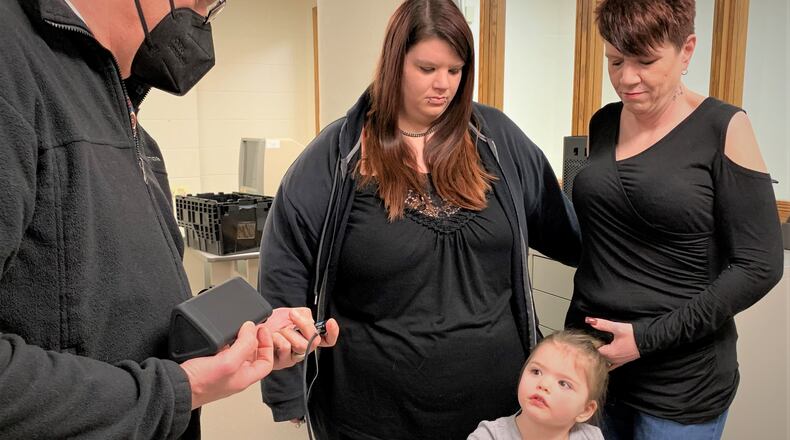Hearing her mother’s story for the first time was emotional, Frauenknecht said.
“I always knew it meant a lot, but I didn’t know why,” she said.
Story Chain typically works with incarcerated adults to allow them read books to their children. Volunteers provide them with children’s books, train their voice over the phone, and provide the parent with recording devices to read the stories aloud. They then deliver an mp3 player or other device to play the audio for their child. Story Chain has since expanded into nursing homes and long-term care facilities, and in spring 2021 started a program to help those isolated by COVID.
Arledge, 52, wanted to do something different. She wanted to record her own story.
When Story Chain founder Jonathan Platt heard, he couldn’t say no. He turned to Heidi Arnold, an English professor from Sinclair Community College and author, who after several interviews with Arledge, wrote the script she would read for her daughter. The 45-minute long memoir is the first original work produced by the Greene County nonprofit.
“If she was imprisoned, she couldn’t write that. We have to be conscious of victim’s rights, and you can’t make any money from anything you publish while incarcerated,” Platt said.
Growing up, Arledge and her siblings were victims of human trafficking, an abuse that was perpetrated by their mother. Arledge later fell into heroin and fentanyl use at an early age, becoming homeless and then serving time in prison for drug-related incidents.
During production of the memoir, Arledge said, some of her editors had to leave the room.
“A lot of people hear my story and they cry. It’s not shocking to me because - I don’t know why - but as a child and as an adult it was normal to me,” Arledge said.
Arledge successfully completed Clinton County’s You-Turn drug court in May, and as of Sept. 25, has been sober for two years.
She works as a mentor for others in the drug court, and has helped 13 people get into rehab in the last five months. She also gives back to Wilmington by volunteering at the soup kitchen and homeless shelter that helped her.
“I still go around to some encampments, buy hygiene products and drop them off,” she said. “Let them know that I didn’t forget them. Now that I’m out of that dark hole, it’s my responsibility to pull other people out.”
Though most people have the ability to record audio in their everyday lives, Story Chain fills a specific need by serving the children of the incarcerated, Platt said.
“Anyone can do what I do. It’ not hard,” Platt said. “We focus on the voice, but we’re creating caregivers for the neediest population.”
“I see people in prisons reading to their kids, getting it edited by people who are lifers, transferring it to an mp3 players and giving it to a child. Anyone can do this. We’re just a professional service that makes it happen,” he added.
Though the full recording is for her daughter’s ears, Arledge said she may expand on the work in the future, in the hopes that her story may help others struggling with recovery.
“It’s a process. You know there’s going to be good days and bad days. Just keep reaching out,” she said.
About the Author

